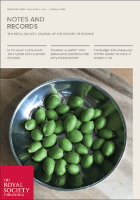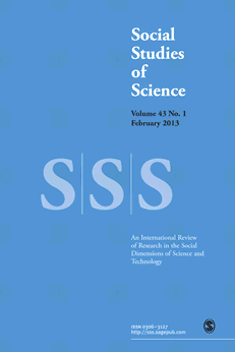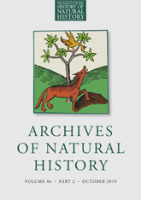
Notes and Records-The Royal Society Journal of the History of Science
Scope & Guideline
Exploring the Roots of Scientific Innovation
Introduction
Aims and Scopes
- Interdisciplinary Historical Analysis:
The journal publishes research that intersects various fields such as history, philosophy, sociology, and cultural studies, focusing on the evolution of scientific ideas and practices. - Biographical Studies of Scientists:
A significant portion of the journal’s content delves into the lives and contributions of notable scientists, exploring their personal narratives and the socio-historical contexts that shaped their work. - Cultural and Social Context of Science:
Contributions often examine how cultural and social factors influenced scientific thought and practice, emphasizing the interplay between science and society. - Technological and Instrumental Histories:
The journal includes studies on the development and impact of scientific instruments and technologies, providing insights into how these tools shaped scientific inquiry. - Global Perspectives on Science:
The journal encourages submissions that consider scientific developments in a global context, highlighting transnational exchanges and the influence of non-Western scientific traditions.
Trending and Emerging
- Sustainability and Environmental History:
There is an increasing focus on sustainability and environmental history, with studies examining the historical context of scientific practices related to ecology and conservation. - Gender and Science:
Emerging themes include the exploration of gender dynamics within scientific communities, highlighting the contributions of women and the impact of gender on scientific practices. - Transnational and Comparative Studies:
The journal has seen a rise in comparative studies that analyze scientific developments across different cultures, emphasizing the interconnectedness of global scientific traditions. - Cultural Representations of Science:
Research exploring how science is represented in literature, art, and popular culture is gaining traction, reflecting an interest in the broader cultural implications of scientific ideas. - History of Science in Non-Western Contexts:
There is a growing emphasis on the history of science outside the Western canon, with more papers focusing on scientific practices and knowledge systems in Asia, Africa, and Latin America.
Declining or Waning
- Traditional Scientific Disciplines:
There is a noticeable decline in papers centered around traditional scientific disciplines such as physics and chemistry in favor of more interdisciplinary and culturally contextual studies. - Eurocentric Narratives of Science:
The journal seems to be moving away from Eurocentric narratives, with fewer articles focusing solely on European scientific developments without considering global influences. - Conventional Historical Methodologies:
The use of conventional historical methodologies, such as straightforward chronological accounts of scientific achievements, appears to be waning as the journal embraces more innovative and multidisciplinary approaches.
Similar Journals

Foundations of Science
Delving into the Intersections of Science and PhilosophyFoundations of Science is a renowned academic journal published by SPRINGER, dedicated to the interdisciplinary exploration of both the historical and philosophical dimensions of science. Established in 1995 and based in the Netherlands, this journal has carved out a significant niche within the History and Philosophy of Science and Multidisciplinary fields, holding an impressive Q2 ranking in both categories as of 2023. The journal's rigorous peer-review process ensures the dissemination of high-quality research, supported by its Scopus rankings, which place it in the top 15% of its peer group in History and Philosophy of Science and the top 28% in Multidisciplinary studies. Although not an open-access journal, Foundations of Science remains accessible through various academic channels, making its vital contributions to the discourse surrounding scientific foundations available to a broad audience. By fostering dialogue across disciplines, it plays a crucial role in advancing the understanding of science's philosophical underpinnings and its historical development, making it an essential resource for researchers, professionals, and students alike.

History of Geo- and Space Sciences
Illuminating the evolution of Earth and planetary science.History of Geo- and Space Sciences is a distinguished open-access journal published by COPERNICUS GESELLSCHAFT MBH since 2010, committed to advancing knowledge in the interdisciplinary fields of Earth and planetary sciences as well as the history and philosophy of science. Based in Germany, this journal operates under ISSN 2190-5010 and E-ISSN 2190-5029, providing a platform for researchers, professionals, and students to disseminate and access high-quality scholarly articles. With a remarkable impact reflected in its 2023 Scopus rankings, placing it in Q3 for Earth and Planetary Sciences (miscellaneous) and Q2 for History and Philosophy of Science, the journal plays a crucial role in fostering dialogue and collaboration among the scientific community. It not only covers significant advancements in geo-sciences but also addresses historical perspectives and philosophical inquiries that shape our understanding of the discipline. Engage with groundbreaking research and broaden your insights by contributing to or reading articles from this pivotal journal.

JOURNAL OF THE HISTORY OF BIOLOGY
Exploring the Roots of Biological DiscoveryJOURNAL OF THE HISTORY OF BIOLOGY, published by Springer, stands as a vital academic resource devoted to examining the historical development of biological science and its philosophical dimensions. This esteemed journal, which has been in continuous publication since 1968 and encompasses research through 2024, is recognized for its significant contributions to the fields of Agricultural and Biological Sciences, and the History and Philosophy of Science, proudly holding a Q2 ranking in both categories as of 2023. With an ISSN of 0022-5010 and an E-ISSN of 1573-0387, it serves a diverse audience of researchers, professionals, and students interested in the interplay between biological advancements and historical context. The journal’s particular emphasis on interdisciplinary investigation provides a platform for innovative scholarship that enriches our understanding of not only the science itself but also its societal implications. While it does not currently offer open access, the rigor and reputation of the journal underscore its importance as a leading publication in the academic landscape of biological history.

History of science and technology
Advancing interdisciplinary dialogue in science and technology history.History of Science and Technology is an esteemed open-access journal published by SUIT Publishing, dedicated to advancing knowledge in the interrelated fields of history, science, technology, and their cultural implications. Since its inception in 2013, this journal has served as a vital platform for researchers, professionals, and students, fostering interdisciplinary dialogue and critical discourse on historical developments in science and technology. With an impressive reputation reflected in its 2023 Scopus rankings, where it ranks in the Q2 and Q3 quartiles across multiple related fields, it has positioned itself as a prominent resource in the academic community. The journal is particularly recognized for its contributions to archeology, museology, and the philosophy of science, making it essential reading for those engaged in these domains. Based in Kyiv, Ukraine, and operating under an open-access model, the History of Science and Technology aims to make high-quality research widely accessible, ultimately enriching the historical narrative and encouraging scholarly engagement across disciplines.

Nuncius-Journal of the History of Science
Illuminating the Past, Inspiring Future InquiryNuncius - Journal of the History of Science, published by BRILL, is a vital resource dedicated to the exploration and analysis of the intricate relationship between science and its historical context. Established with the goal of fostering scholarly discussion, this journal serves as a platform for researchers and historians to present their findings and interpretations regarding the evolution of scientific thought. With an impact factor reflective of its academic rigor and ranked in the Q3 category in the field of History and Philosophy of Science, it offers a rich archive of articles spanning converged years from 1986 to 2024. Nuncius encourages submissions that advance the understanding of science's impact on society, culture, and its philosophical underpinnings, making it a key reference for those engaged in the histories that define modern scientific inquiry. Situated in the scholarly landscape of the Netherlands, Nuncius remains an essential read for professionals, students, and academics seeking to deepen their knowledge in this significant field.

PHILOSOPHY OF SCIENCE
Pioneering Discussions in the Philosophy of SciencePHILOSOPHY OF SCIENCE, published by Cambridge University Press, serves as a premier journal at the intersection of history, philosophy, and science, making significant contributions to our understanding of scientific inquiry and its historical contexts. With an impressive impact factor reflected in its 2023 Category Quartiles—ranking Q1 in History, Q1 in History and Philosophy of Science, and Q1 in Philosophy—this journal stands out as a vital resource for researchers, professionals, and students alike. Operating without Open Access, it encourages the dissemination of groundbreaking ideas from 1949 through 2024, illustrated by its robust Scopus rankings, including a remarkable 98th percentile in the History category. Based in the United Kingdom at the prestigious Cambridge campus, PHILOSOPHY OF SCIENCE is committed to fostering scholarly dialogue and advancing critical thought in the philosophy of science.

CENTAURUS
Bridging Scientific Innovation and Philosophical ReflectionCENTAURUS is a prestigious journal dedicated to the History and Philosophy of Science, published by BREPOLS PUBL in the United States. With a storied history dating back to its inception in 1950, CENTAURUS has consistently provided a platform for critical engagement and scholarly discourse in the realm of scientific development and its philosophical implications. Recognized for its academic rigor, the journal holds a commendable Q2 ranking in the History and Philosophy of Science category for 2023, reflecting its substantial contribution to the field, as evidenced by its ranking in the top 11% of 223 journals in Scopus. Although it operates on a subscription-based model, the journal is a vital resource for researchers, professionals, and students seeking insightful analyses and discussions on the interplay between science and its philosophical dimensions. Published from Turnhout, Belgium, CENTAURUS continues to shape the landscape of scientific thought with its well-curated articles that examine over a decade's worth of scholarly contributions.

Metode Science Studies Journal
Pioneering New Perspectives in Science StudiesMetode Science Studies Journal, published by UNIV VALENCIA, BOTANICAL GARDEN UV, is an esteemed open-access journal dedicated to advancing scholarly discourse in the fields of history and philosophy of science and multidisciplinary studies. Since its inception in 2013, the journal has positioned itself as a vital resource for researchers, professionals, and students, fostering an environment for innovative research and cross-disciplinary dialogue. Based in the vibrant city of Valencia, Spain, this journal aims to publish high-quality articles that explore the intricate relationships between scientific practices and philosophical inquiries. With a current impact factor demonstrating its relevance in the academic community, the journal is indexed in Scopus, ranking in the 52nd percentile for history and philosophy of science and the 33rd percentile for multidisciplinary studies. Scholars can access a breadth of research outputs that span from 2015 to 2024, thereby contributing significantly to the intellectual landscape of the respective fields.

SOCIAL STUDIES OF SCIENCE
Innovating Perspectives on Science and Social InteractionsThe SOCIAL STUDIES OF SCIENCE, published by SAGE PUBLICATIONS LTD, is a prestigious academic journal that has been at the forefront of interdisciplinary research since its inception in 1971. With an ISSN of 0306-3127 and an E-ISSN of 1460-3659, this journal serves as a vital platform for exploring the complex interactions between science, technology, and society. Well-recognized in the academic community, it boasts an impressive impact factor and is ranked in the Q1 quartile within major categories such as History, History and Philosophy of Science, and General Social Sciences, placing it in the top echelons of its field. Scopus rankings further emphasize its significance, notably achieving rank #9 out of 1760 in Arts and Humanities for History and a 99th percentile rank. This journal encourages Open Access for maximized outreach, although specific open access options are currently limited. The SOCIAL STUDIES OF SCIENCE is essential for researchers, professionals, and students alike, aiming to foster a deeper understanding of how scientific practices shape, and are shaped by, societal dynamics.

ARCHIVES OF NATURAL HISTORY
Unearthing the Past, Enriching the FutureARCHIVES OF NATURAL HISTORY is a distinguished scholarly journal published by Edinburgh University Press, focusing on the interplay between history, anthropology, and the broader spectrum of natural sciences. With its ISSN 0260-9541 and E-ISSN 1755-6260, the journal serves as a vital resource for researchers and professionals in the fields of natural history and related disciplines. Encompassing a comprehensive range of topics from the history of nature to the evolution of environmental science, it has achieved a commendable impact factor and consistently ranks Q3 in both Agricultural and Biological Sciences and Anthropology, while significantly excelling with a Q1 rating in History as per the latest evaluations. The journal encompasses articles spanning from 1981 to 2024, enhancing its repository of knowledge with a historical depth seldom found in contemporary publications. Despite not being an open-access journal, it remains accessible to a global audience of scholars eager to explore nature's narratives and their historical significance. Engage with ARCHIVES OF NATURAL HISTORY to delve into a rich tapestry of interdisciplinary research that celebrates our planet's biological and cultural heritage.